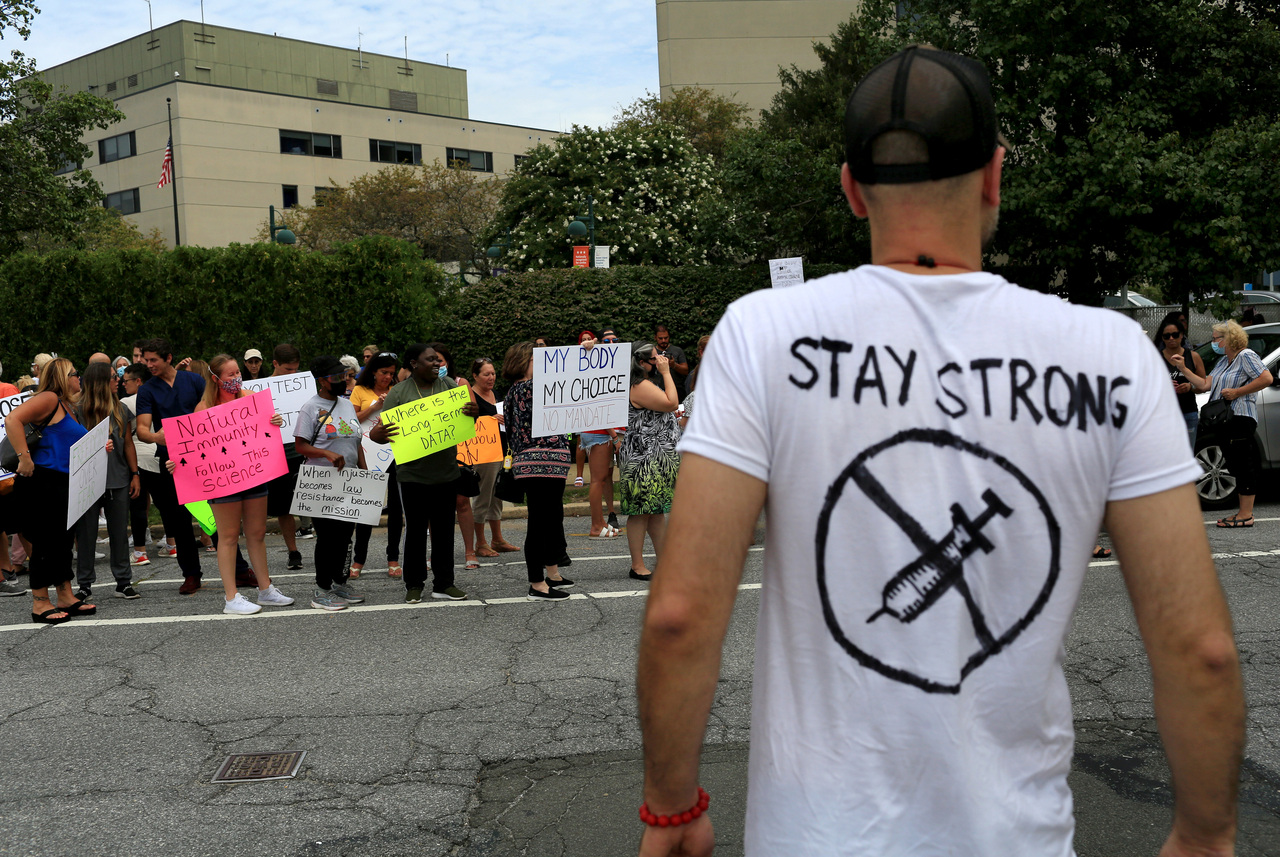How governments are tackling anti Covid-19 vaccine misinformation
Sign up now: Get insights on Asia's fast-moving developments

A protest against Covid-19 vaccination in New York on Aug 16, 2021.
PHOTO: NYTNS
SINGAPORE - Anti-vaxxers are turning social media into a cesspool of Covid-19 misinformation and conspiracy theories as these platforms and governments struggle to quell the growing wave of falsehoods.
False claims that Covid-19 vaccines contain microchips, can cause autism and sterility are fuelling vaccine hesitancy all over the world, undermining efforts to end the nearly two-year-long pandemic that has battered the global economy and hurt livelihoods.
"People who are exposed to a large amount of misleading and false information about the virus, especially on social media, and discuss news mostly within their echo chambers, will be more likely to endorse conspiracy theories," Dr Maria Chayinska, a social psychology researcher at the Pontifical Catholic University of Chile told Emerging Europe news site.
"It is not merely a response to their perceived anxiety but a normative group behaviour," she added.
Social media operators have come under increased scrutiny for their role in the spread of unsubstantiated information, with governments pushing them to clamp down on false claims and hoaxes.
The social media platforms have taken several remedial steps, including removing false information about Covid-19 vaccines, banning all anti-vaccine content and permanently suspending repeat offenders' accounts.
A report in March by British non-profit Centre for Countering Digital Hate (CCDH) found that almost two-third of Covid-19 misinformation came from 12 people, who have a combined following of 59 million people across multiple social media platforms.
Among the "disinformation dozen" is lawyer-environmentalist Robert F. Kennedy Jr, a nephew of late US President John F. Kennedy, who linked the pandemic to the 5G roll-out.
An exasperated US President Joe Biden took aim at vaccine resistance on Sept 9 by mandating Covid-19 jabs for most federal employees while urging employers to get their staff to follow suit or conduct weekly tests.
Over in Britain, anti-vaccination advocates have staged protests, stormed schools, disseminated fake vaccine information and threatened legal action.
The government, public health officials and other organisations have attempted to address the spread of misinformation by roping in prominent community leaders to spread messages such as how to find accurate data about Covid-19 vaccines.
It has also come up with a novel online game called Go Viral that educates players on the dangers of fake news by plunging them into a world of misinformation. Research showed that playing a single round can reduce perceived reliability of fake news by an average of 21 per cent.
In Europe, where anti-vaccination protests have been held across the continent as extremists and far-right politicians keep up the social media spread of conspiracy theories about vaccines, the European Commission has proposed more fact checking and algorithm changes for social media companies.
Under a revised code of practice proposed by Brussels in May, companies such as Facebook, Google and Twitter would need to show why a particular material is disseminated and prove that false information is being blocked.

False claims about Covid-19 vaccines are fuelling vaccine hesitancy all over the world.
PHOTO: NYTIMES
In Asia, Malaysian Health Minister Khairy Jamaluddin has warned "annoying" anti-vaxxer groups that the government will "make life very difficult for you and continue to make life difficult for you".
Malaysia has taken several steps to check disinformation spread by anti-vaxxer groups, with the health ministry recently lodging several police reports against them for spreading fake news and threatening public health.
The authorities have also arrested and charged several individuals for spreading fake news on Covid-19.
The Malaysian Communications and Multimedia Commission has set up a fact-checking website, which has already put up more than 500 articles debunking myths and alerting the public to scams related to Covid-19.
In neighbouring Indonesia, anti-vaccine discourse is often a mix of Islamic views, global Covid-19 conspiracy theories and domestic anti-government sentiments.
A considerable number of anti-vaccine videos on TikTok have been made by religious micro-influencers, noted a paper by ISEAS - Yusof Ishak Institute researchers published in June this year.
The Indonesian government has asked social media companies to remove misinformation and block accounts that spread misinformation, while also intensifying its vaccination campaign on social media by using celebrities and influencers.
A government task force has also been set up to identify hoaxes and fake news, working with organisations such as Unicef and home-grown Anti-Slander Society (Mafindo) to help counter misinformation.
In Japan, books by doctors opposing vaccinations are filling best-seller sections at bookstores, while some anti-vaccine groups have signed petitions, filed lawsuits and demonstrated in the streets to call for vaccinations to be halted.
On the flip side, a group of doctors and health practitioners have rolled out the Cov-Navi website which provides accurate, easy-to-understand information.
The country has also received a little help from Corowa-kun, a cheerful cartoon dog chatbot to spread lessons learnt from overseas vaccination efforts and to counter inaccurate information in social media.


